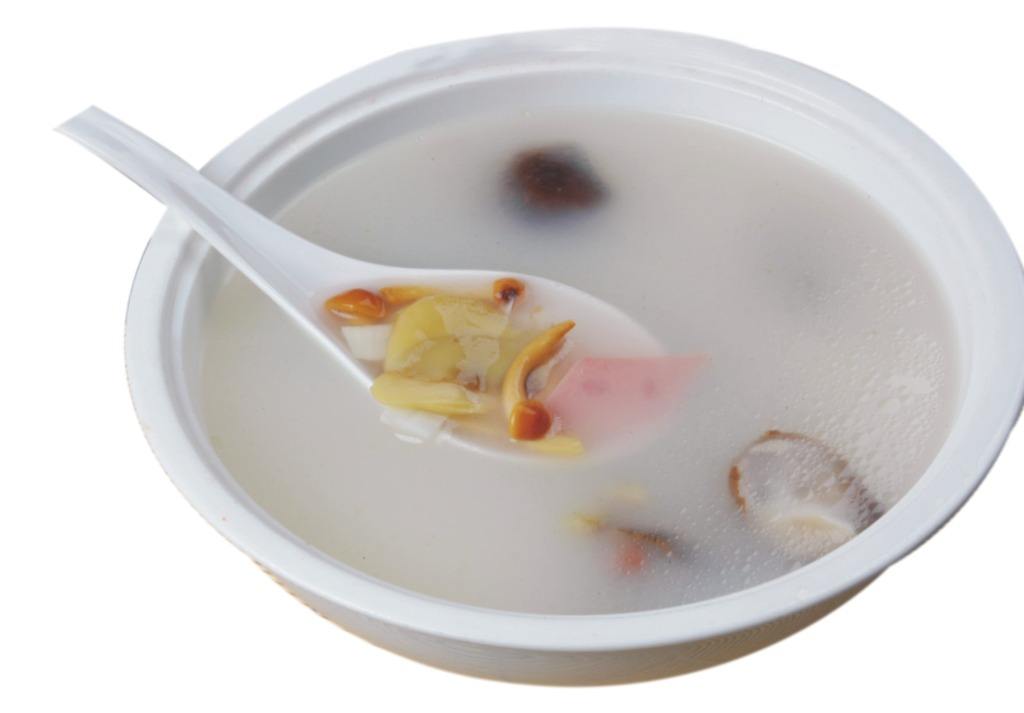Todd: Okay. So Sarah, I see you eat soup every day at work. Why are you eating soup every day?
托德:好。萨拉,我看到你每天上班都会喝汤。你为什么每天都喝汤?
Sarah: That's because I love to cook soup.
萨拉:因为我喜欢做汤喝。
Todd: So you make the soup?
托德:你自己动手做汤?
Sarah: Yes, it's very easy to make.
萨拉:对,很容易做的。
Todd: So you cook it and then you just bring it to work everyday?
托德:你做好以后带去办公室?
Sarah: Yeah. I just make a lot on Monday and then I bring it to work everyday of the week.
萨拉:对。我周一会做很多汤,然后工作日每天带一点去办公室。
Todd: Oh nice. So how do you make the soup? What's your secret?
托德:真不错。你怎么做汤?有什么秘诀吗?
Sarah: Well, I like to cook very easy. So I buy meat that's already cut up, usually, chicken and then some rice, usually brown rice and then I buy some vegetables. So after I bought the ingredients, I chop them up and I put them all together in water until boils and add some seasoning.
萨拉:我喜欢简单烹饪。我会买已经切好的肉,通常我会买鸡肉,再买些糙米和蔬菜。买好原料以后,我会把它们切碎,然后等水开以后一起放进去煮,最后再加一些调味品。
Todd: Okay. So you say the water boils, so as soon as the water boils that's when you put in all the ingredients?
托德:好。你说把水煮开,那是水一开你就把所有原料都放进去煮吗?
Sarah: Yes, that's right.
萨拉:对,没错。
Todd: So you don't put in the ingredients before the water boils.
托德:在水煮开以前不放原料。
Sarah: No. I guess, it's just easier for the water to be hot because then the vegetables and the meat cook a little faster.
萨拉:不放。水开以后再放进去煮比较容易,因为这样蔬菜和肉熟的更快。
Todd: So how do you give the soup flavoring?
托德:那怎么给汤调味?
Sarah: I usually add salt and pepper, maybe some garlic. And depending on the type of soup, either maybe some soy sauce or lemon juice.
萨拉:一般我会加盐、辣椒还有一些大蒜。这要取决于是哪种汤,有的汤要放酱油或柠檬汁。
Todd: Okay. Do you put in the flavoring after you put in the ingredients or before you put in the ingredients?
托德:好。你是在放原料之后加调味品还是在之前调味?
Sarah: Maybe after but usually, right about all at the same time.
萨拉:放原料之后,不过我差不多是同时进行调味。
Todd: Okay.
托德:好。
Sarah: So I just put everything in at one time.
萨拉:我会同时把所有东西放进去。
Todd: And then after you cook the soup, do you put the soup in the refrigerator? Do you let it sit outside?
托德:汤做好以后你是把汤放进冰箱吗?还是先在外面放一会儿?
Sarah: I usually eat some right then, and I also put it in containers for the week. But I let it sit in the containers out on the counter for a while for it to cool before I put in the refrigerator.
萨拉:做好以后我会喝一点儿,然后把要带去办公室的汤放在容器里。装汤的容器要先在厨房的操作台上放一会儿,然后再放进冰箱。
Todd: All right. And so, you don't put it in the refrigerator until it is cool?
托德:好。在汤凉了以后你才会放到冰箱里去?
Sarah: Until it's about room temperature.
萨拉:在汤的温度和室温差不多的时候放进去。
Todd: Okay, nice. And then how do you heat it up? Do you heat it up in a pot or do you heat it up in the microwave?
托德:好,很好。那你怎么加热?你是用锅热汤还是用微波炉热?
Sarah: In the microwave. It's the easiest.
萨拉:用微波炉。这是最简单的方法。
Todd: Yeah. Nice. So you make enough for five meals?
托德:对,不错。你会做出足够五顿饭的量?
Sarah: Maybe, sometimes. If I think I will get tired of eating it during the week then maybe I'll just make enough for three or four meals. But if it's some kind that I think is really delicious and I know I want to eat it everyday, then I'll make a lot.
萨拉:也许吧,有时是。如果我认为这个汤喝一礼拜我会喝腻,那我可能只做三四顿的量出来。如果我认为那个汤非常好喝,我知道我想每天都喝,那我就会多做一些。
Todd: Well, if that happens, when you make the soup, you can make it for six or seven and give me a bowl.
托德:如果是这样,你做汤的时候,可以做出六七顿的量来,然后给我一碗。
Sarah: Okay. I'll do that next time.
萨拉:好。下次我就这么做。
Todd: Oh great. Thanks.
托德:真不错。谢谢。

译文属可可原创,仅供学习交流使用,未经许可请勿转载












